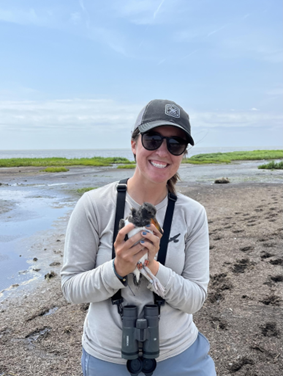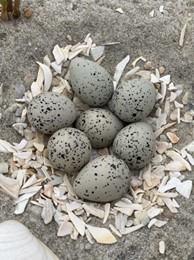Staff Spotlight
Emmy Casper, Wildlife Biologist

Emmy Casper, Wildlife Biologist
Emmy grew up on the Jersey Shore, where she developed a strong passion for coastal wildlife conservation. In 2020 she joined CWF as a beach-nesting bird technician and spent three seasons monitoring populations of piping plovers, American oystercatchers, and colonial bird species at Edwin B. Forsythe National Wildlife Refuge. During her third season, she served as the crew leader and helped lead the first official season of bird monitoring on Horseshoe Island. Since joining the full-time staff in 2022, Emmy has traded the Atlantic Coast for the Delaware Bayshore, where she manages CWF’s new American oystercatcher and salt marsh restoration projects. She holds a B.S. and an M.S. in Biology from Fordham University, where she conducted her thesis on the molecular analysis of shorebird diet during spring migration in Jamaica Bay.
What’s your favorite species and why?
It’s almost impossible to choose, but piping plovers are so special to me. They jump-started my career in conservation, and their resilience in the face of many challenges inspires me to persevere in my own life.
What’s the most surprising or unusual thing that has happened to you while doing field work?
I was pretty flabbergasted when a piping plover pair laid a seven-egg nest during my first field season at Holgate. The pair’s original four-egg nest had been flooded, so we re-assembled it with the hope that the birds would resume incubating the eggs. Instead, the pair decided to lay three new eggs in the same nest! Unfortunately, the eggs were depredated before they could hatch, but I think a brood with 7+ chicks would have been a sight to behold.

Who or what was the biggest influence that led to your career working with wildlife?
I always had an affinity for wildlife, but when I was around 10, my mom registered me for a marine science day camp with New Jersey Sea Grant on Sandy Hook. I became obsessed with marine biology and returned to camp every summer until I was too old to attend, and they had no choice but to hire me as a field instructor. The amazing staff at NJ Sea Grant ignited my passion for coastal conservation and started a domino effect that led me to pursue a high school education at the Marine Academy of Science of Technology (also on Sandy Hook), where I conducted a research project on piping plovers…and the rest is history
What’s the best thing about your job at CWF?
The sense of fulfillment that comes when hard work translates to positive impacts for the species we work with. Watching a plover or oystercatcher pair successfully fledge chicks, after monitoring that pair for an entire season (or even multiple seasons), is such a rewarding experience
What’s your favorite thing to do when you aren’t working?
I love trying out new crafting hobbies. My current favorites include knitting, candle making, and basket weaving.
Discover more from Conserve Wildlife Foundation of NJ
Subscribe to get the latest posts sent to your email.